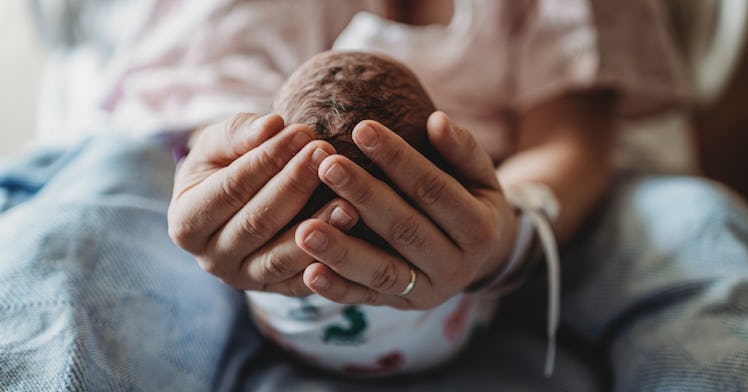Here’s Why You’re Hearing About “Rainbow Babies” All of a Sudden
As women become more open about pregnancy and infant loss, the term has become more common.

A “rainbow baby” is a baby born after a miscarriage, stillbirth, or death of an infant from natural causes. It’s a reference to the appearance of a rainbow after the ravages of a storm. The usage of the term dates to at least 2008, when it appeared in a compendium of stories from women who elected to have abortions in the face of poor prenatal diagnoses or serious maternal health complications. But if you’ve heard the term recently, there are a number of cultural forces at work that have made this possible.
The first two? National Rainbow Baby Day was on August 22, and October is Pregnancy and Infant Loss Awareness Month. That these celebrations exist is evidence that this particular kind of loss is slowly but surely becoming a topic that is openly discussed in public. And that’s a huge driving force for the surge in use of the term: people are more openly talking about pregnancy loss, now more than ever.
“For parents who have experienced the sting of loss, the term ‘rainbow baby’ is comforting because of the joy that they experience after hardship and pain whether recent or in the past,” Quantrilla Ard, a health psychologist, told Insider. “… Sharing pregnancy loss and infant death have been a very sensitive and taboo topic for years. Now families are coming to recognize that they are not alone. They are finding that there is great strength in community, and sharing their stories connects them to others rather than isolates them.”
In that sense, the usage of the term “rainbow baby” is a good thing. But some parents don’t like to be reminded of their previous experience. As one mom told Insider, “I don’t feel connected to the term at all and avoid conversations about rainbow babies in mom groups.”
“It’s triggering for me, I think,” she continued. “I don’t want to constantly be reminded of the loss I experienced every time I think about this little girl. I’m just trying to enjoy this separate, very special experience on its own.”
While it’s unfortunate that some moms don’t identify with the phrase, it would be hard to argue that it’s not a good thing that so many moms appear to be bonding over the phrase. And if a new vocabulary that accurately describes their sorrows and joys continues to develop, the taboo around pregnancy and infant loss will hopefully continue to ebb.